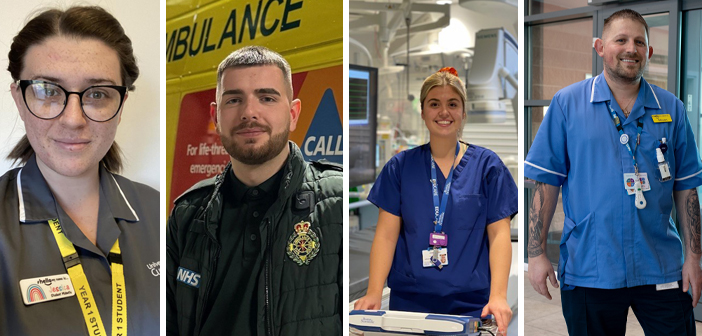MORE than 3,000 NHS apprenticeships started in the North West in the past year, providing more opportunities for people to start careers in the NHS, whilst boosting staffing levels and providing outstanding care to communities.
At the start of National Apprenticeships Week (5-11 February), and as the NHS nationally secures the accolade of the nation’s biggest trainer of apprentices, figures show significant growth in people in the North West enrolling on to apprenticeships with the health service.
Figures show 3,239 people in the region started training with the NHS during 2022/23, a 6.5% increase compared to pre-Covid times.
Jess Lancaster, a student on the registered midwife degree apprenticeship programme, had never been to university and left school after finishing GCSEs. It was while working for the NHS supporting mums with infant feeding and smoking cessation that Jess learned about midwifery apprenticeships.
She said: “I’m now halfway through my apprenticeship and I love it as much now as I did the day I first started. It’s a huge privilege to care for women and families through their maternity journey and to work alongside the amazing midwives and multi professional teams at the Trust.
“I’ve learned so much so far, and although I know I still have a long way to go in these next 18 months before the end of the course, I feel like I’ve got all the support I need from the midwives I work alongside and the academic staff at the university to succeed in becoming a qualified midwife.”
Apprentices are a crucial part of the NHS Long Term Workforce Plan and NHS England aims to triple the number being trained by 2030, so they make up more than one in five new recruits.
With over 600 NHS apprenticeships spanning a vast range of careers, budding apprentices have a range of options.
Lewis Fouracre started with the NHS at 16 as a healthcare cadet with Skills for Health. He joined North West Ambulance Service as an Emergency Medical Technician (EMT) apprentice and followed the career path to recently complete a Paramedic Science Apprenticeship.
He said: “If you thrive on hands-on learning and seek both practical experience in a paid position and a recognised academic qualification, I strongly recommend considering an apprenticeship with the North West Ambulance Service.
“Balancing operational duties and study may pose challenges, but the rewards make the experience highly worthwhile. It’s worth noting that while I pursed an apprenticeship for a frontline role, NWAS also offers opportunities for apprenticeships in corporate, IT and fleet support sectors of the trust.”
Last year, 66 percent of apprentices studied on higher or degree apprenticeships (equivalent to foundation, full Bachelor’s or Master’s degrees), up from 64 percent the year before. The apprenticeships also mean they can earn while they learn and not have to go to university first.
For Olivia Hamer, who works at Wythenshawe Hospital in South Manchester, an NHS degree apprenticeship has enabled her to fast track her way to a successful career and saved thousands of pounds in university fees.
She is now one of the youngest Specialist Cardiac Physiologists in her department at Wythenshawe Hospital’s North-West Heart Centre, which is one of the leading specialist sites in the UK.
She said: “My training here has been phenomenal and the steepest learning curve I’ve ever experienced. I would definitely recommend an apprenticeship, if you’re considering your options. During my training, I got a percentage of a full-time wage and the remaining money funded my course. I’m not in any debt now, that’s the bonus. I didn’t pay for my studies, so that’s the advantage for most people.”
Olivia has worked hard to get where she is today. During term time she was training in hospital three days a week, doing one day at university and given an extra study day.
“I feel like I’ve been helped, in practical and in life terms. Before I started working here, I wouldn’t have had a conversation with a stranger. I wasn’t shy but coming in at 18, it’s a very difficult time to arrive in an environment like this,” she said.
A total of 24,836 apprentices started training last year and apprenticeships are a crucial part of the NHS Long Term Workforce Plan.
Age is also no barrier. Steven Jewell, a 42-year-old former greengrocer who left school at 15 with no qualifications, recently completed the Registered Nursing Degree Apprenticeship and now works at Lancashire and South Cumbria NHS Foundation Trust. He said: “Without the apprenticeship, I would never have been able to go to university or be in the position I am today. At nearly 40, being afforded the opportunity to earn a salary while taking a degree level course with blended work-placed learning, truly changed my life.
“The apprentice route has enabled me to go from greengrocer to registered mental health nurse in just over four years. I am now in a job I love, helping other people, as well as changing my life for the better. Don’t ever think you are too old or not smart enough. Apprenticeships provide all of us with equal opportunities to our peers, and enable us to change course in life – we just have to want it.”
Chris Cutts, Regional Director of Workforce, Training and Education at NHS England North West, said: “Apprentices are at the heart of our Long Term Workforce Plan and we believe that everyone should have the opportunity to develop their skills and expertise. Apprenticeships set people on the path to achieve their long term career aspiration, putting staffing on a sustainable footing and improve patient care.
“We are, during National Apprenticeship Week, proud to celebrate apprentices, which is a great way to not only attract new talent to the NHS but also develop the skills of the existing workforce.
More information on NHS apprenticeships is available here.




